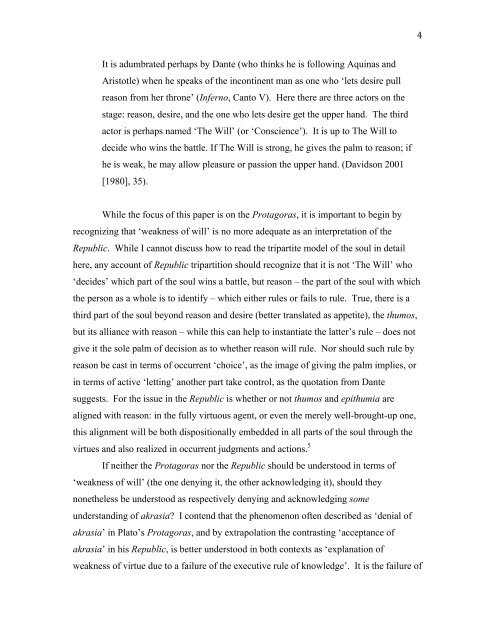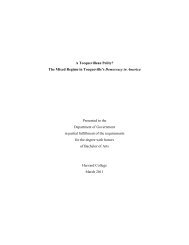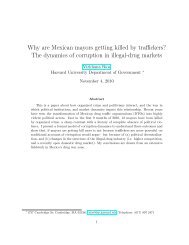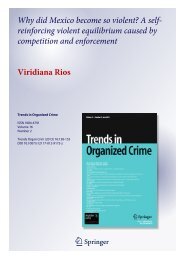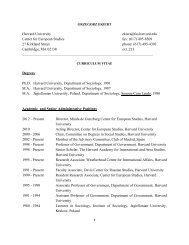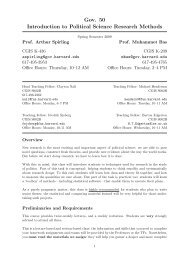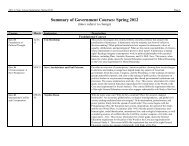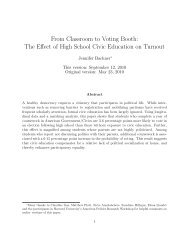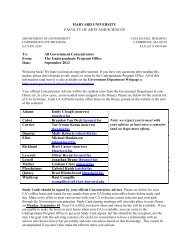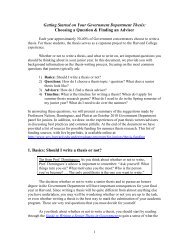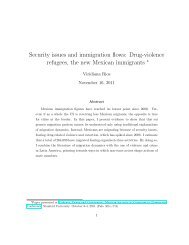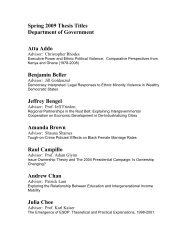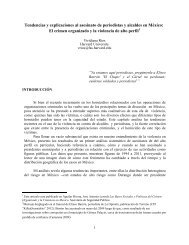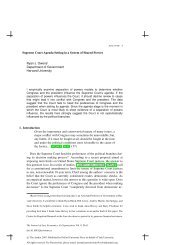1 Harvard University Political Theory Colloquium For 11 March 2010 ...
1 Harvard University Political Theory Colloquium For 11 March 2010 ...
1 Harvard University Political Theory Colloquium For 11 March 2010 ...
Create successful ePaper yourself
Turn your PDF publications into a flip-book with our unique Google optimized e-Paper software.
4 <br />
It is adumbrated perhaps by Dante (who thinks he is following Aquinas and<br />
Aristotle) when he speaks of the incontinent man as one who ‘lets desire pull<br />
reason from her throne’ (Inferno, Canto V). Here there are three actors on the<br />
stage: reason, desire, and the one who lets desire get the upper hand. The third<br />
actor is perhaps named ‘The Will’ (or ‘Conscience’). It is up to The Will to<br />
decide who wins the battle. If The Will is strong, he gives the palm to reason; if<br />
he is weak, he may allow pleasure or passion the upper hand. (Davidson 2001<br />
[1980], 35).<br />
While the focus of this paper is on the Protagoras, it is important to begin by<br />
recognizing that ‘weakness of will’ is no more adequate as an interpretation of the<br />
Republic. While I cannot discuss how to read the tripartite model of the soul in detail<br />
here, any account of Republic tripartition should recognize that it is not ‘The Will’ who<br />
‘decides’ which part of the soul wins a battle, but reason – the part of the soul with which<br />
the person as a whole is to identify – which either rules or fails to rule. True, there is a<br />
third part of the soul beyond reason and desire (better translated as appetite), the thumos,<br />
but its alliance with reason – while this can help to instantiate the latter’s rule – does not<br />
give it the sole palm of decision as to whether reason will rule. Nor should such rule by<br />
reason be cast in terms of occurrent ‘choice’, as the image of giving the palm implies, or<br />
in terms of active ‘letting’ another part take control, as the quotation from Dante<br />
suggests. <strong>For</strong> the issue in the Republic is whether or not thumos and epithumia are<br />
aligned with reason: in the fully virtuous agent, or even the merely well-brought-up one,<br />
this alignment will be both dispositionally embedded in all parts of the soul through the<br />
virtues and also realized in occurrent judgments and actions. 5<br />
If neither the Protagoras nor the Republic should be understood in terms of<br />
‘weakness of will’ (the one denying it, the other acknowledging it), should they<br />
nonetheless be understood as respectively denying and acknowledging some<br />
understanding of akrasia? I contend that the phenomenon often described as ‘denial of<br />
akrasia’ in Plato’s Protagoras, and by extrapolation the contrasting ‘acceptance of<br />
akrasia’ in his Republic, is better understood in both contexts as ‘explanation of<br />
weakness of virtue due to a failure of the executive rule of knowledge’. It is the failure of


